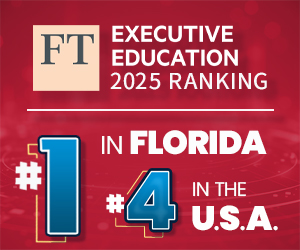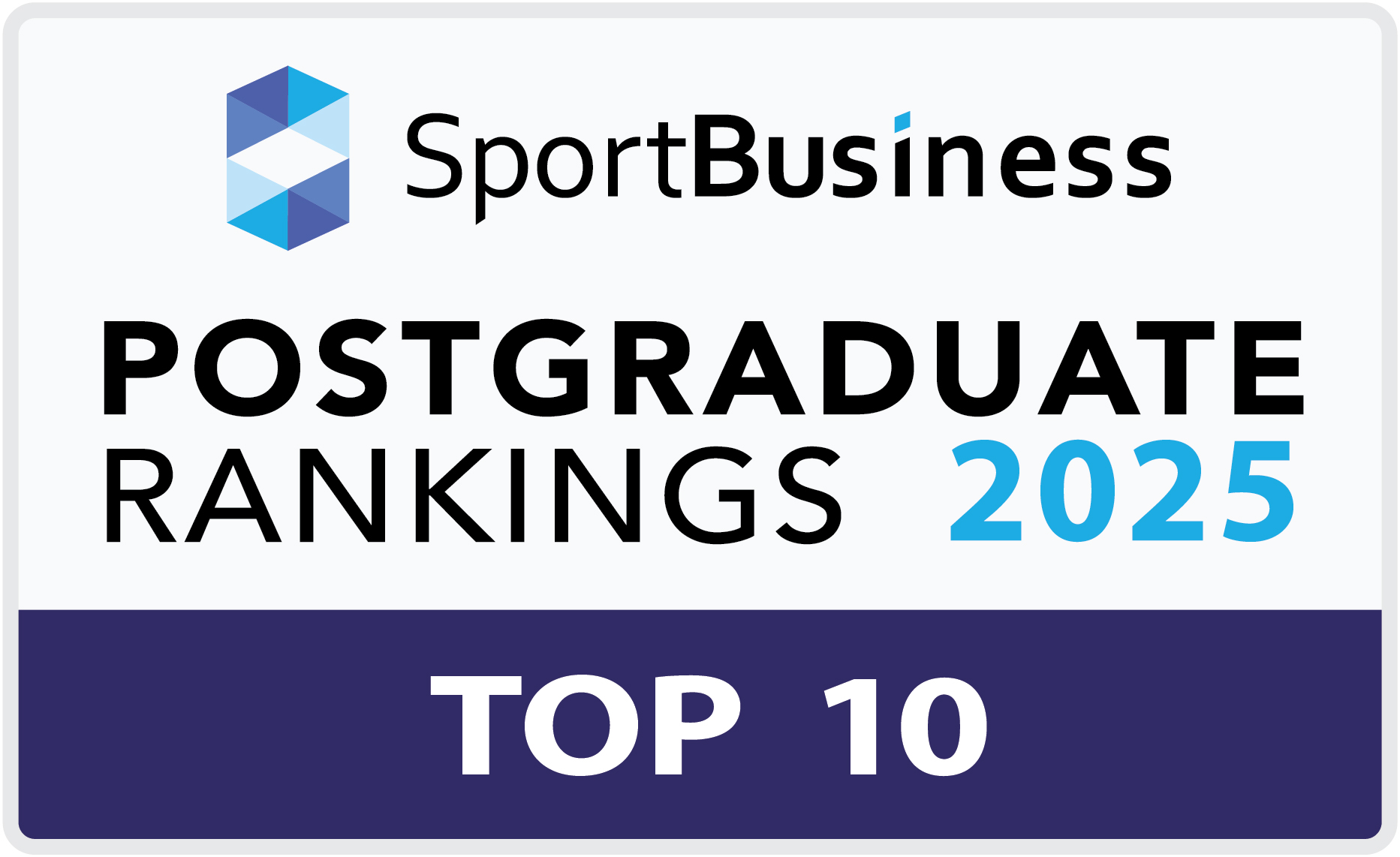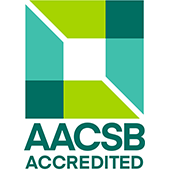Executive PhD Curriculum
New Hybrid Format: Students May Attend Courses In-person or Live Online
The three year Executive PhD program is 80 Credits.
- First two years students complete required course work in accordance with residency requirements (one in-person residency weekend required during the fall, spring, and summer semesters - three mandatory residency weekends minimum per academic year).
- The third year students work on their dissertation.
Year 1-2:
- Tools Courses (12 Credits)
- Seminar Courses (36 Credits)
- Research Courses in area of interest (6 Credits)
Year 3:
- Dissertation Courses (26 Credits)
- Defense of Dissertation
Tools Courses
QMB 7565 Research Methods 1 (3 credits)
Intermediate-level statistical methods with emphasis on applications and interactive
computing. Basic principles of experimental and non-experimental research. Analysis
and critique of journal articles from various business disciplines.
QMB 7566 Research Methods 2 (3 credits)
Advanced statistical methods including multiple regression and associated diagnostics,
non-linear models, log-linear and logit models, and logistic regression. Emphasis
on published applications and interactive computing.
ECO 6424 Topics in Econometrics (3 credits)
Selected topics in Econometrics.
MAN 7640 Scientific Methods in Business (3 Credits)
Provides Business PhD students with an exposure to the major issues and debates on
the scientific method in business, including the use and applications of insights
from philosophy of science as it pertains to the business disciplines and an introduction
to research design.
Seminar Courses
ECO 7178 Microeconomic Foundations of Strategic Decision Making (3 Credits)
This course teaches analysis of strategic decisions. The primary emphasis is on decisions
at the line of business level, although we will also consider strategy at the corporate
level. The primary analytical method is economics.
ECO 7296 Contemporary Issues in Global Macroeconomics (3 Credits)
Advanced analysis of macroeconomics and the global business environment. In-depth
discussion of both long-run growth and short-run economic fluctuations. Emphasis is
on the macroeconomic and financial connectedness of national economies and on business
decision-making in global markets characterized by random shocks, crises, and economic
policy uncertainty.
FIN 7895 State of the Art Managerial Finance (3 Credits)
The course covers the theory of practice of financial planning and management. It
emphasizes the capital structure of business enterprise, its cost of capital, and
its evaluation. Applications of quantitative methods to capital theory.
FIN 7808 Theory of Corporate Finance: Readings and Empirics (3 Credits)
This doctoral seminar provides an in-depth analysis of theory and empirical research
in capital markets and corporate finance. Corporate finance topics include theories
of capital budgeting, capital structure, dividends, agency, signaling, corporate governance,
financial distress and other areas of corporate finance.
ACG 7837 Survey of Behavioral Accounting Research (3 Credits)
This course serves as a survey of behavioral accounting research for doctoral candidates
in the business PhD, executive concentration program. The course includes behavioral
research methods that are applied to accounting topics that may be of interest to
students seeking a business PhD executive concentration. Methods include surveys,
experiments and verbal protocols. Topics include accounting education, corporate governance,
taxpayer issues, investor judgments and auditor judgments.
ACG 7886 Survey of Archival Accounting Research (3 Credits)
This course is a survey of archival accounting research for doctoral candidates in
the Business PhD, executive concentration program. The course includes basic archival
accounting research methods and topics that are of interest to students seeking a
business PhD executive concentration. Methods include simple regression and event
studies. Topics include earnings quality, audit quality, audit fees and executive
compensation.
ACG 7918 Seminar in Current Accounting Research Issues (3 Credits)
Critical, in-depth consideration of selected accounting topics of particular relevance
to current accounting practice and research.
MAN 7779 Advanced Management Theory (3 Credits)
Examines the major theoretical perspectives pertaining to both macro level functioning
of organizations and micro level individual and group behaviors within organizations,
with a special emphasis on the implications for managers.
MAN 7729 Strategic Management (3 Credits)
Top management tasks and responsibilities to ensure the creation of the long-term
value of the firm. This includes maintaining the legitimacy of the firm in terms of
stockholders, world events, and ethical behavior.
MAR 7936 Seminar in Marketing 1 (3 Credits)
A sequence of courses dealing with a range of significant topics and issues.
MAR 7936 Seminar in Marketing 2 (3 Credits)
A sequence of courses dealing with a range of significant topics and issues.
ISM 7345 Organizational Impacts of Information Systems (3 Credits)
Analysis of theory and research on the impacts of information systems on human behavior
and upon organizational design.
ISM 7935 Seminar in Information Systems (3 Credits)
Introduction to the conduct of research in IS: defining research questions, reviewing
the literature, developing strategies for empirical investigation, and presenting
research findings.
Research Courses
Students will choose area of interest.
ACG 7978 Advanced Research in Accounting (6 credits)
Research focused on accounting studies to prepare for the accounting comprehensive
written and/or oral exam in the PhD program or to develop an accounting dissertation
topic.
ECO 7978 Advanced Research in Economics (6 credits)
Research focused on Economics to develop a dissertation topic.
FIN 7978 Advanced Research in Finance (6 credits)
Research focused on finance studies to prepare for the finance comprehensive written
and/or oral exam in the PhD program or to develop a finance dissertation topic.
ISM 7978 Advanced Research in Information Technology (6 credits)
Research focused on information technology studies to prepare for the comprehensive
written and/or oral exam in the PhD program or to develop a dissertation topic.
MAN 7978 Advanced Research in Management (6 credits)
Research focused on management studies to prepare for the management comprehensive
written and/or oral exam in the PhD program or to develop a management dissertation
topic.
MAR 7979 Supervised Research in Marketing (6 credits)
A directed research experience for doctoral students.
Dissertation Requirements
Each Executive PhD student is required to complete an original body of research targeted at an identifiable business problem. Traditionally, terminal degree candidates focus on scholarly pieces that are targeted for academic research outlets/journals. While the Executive PhD student can develop work along a similar line, they may also seek to address more applied business issues or phenomena.
Stages of dissertation:
Dissertation Chair Selection
The expectation is that the Executive PhD student begins to develop a research topic
for the dissertation during the latter stages of their second year of course work.
The student will then meet with business faculty to discuss / refine the research
idea and persuade one faculty member to serve as dissertation committee chair.
Constitution of the Dissertation Committee
The student’s dissertation chair will assist the student in identifying appropriate
faculty to serve on the dissertation committee and assist in the development, delivery,
and evaluation of an original body of research.
Dissertation Proposal
The student will work with their dissertation chair and committee to develop a formal
proposal of an appropriate topic. This is done typically in the summer of the second
year in the program into the fall of the third year. The student will then present
and formally defend the dissertation proposal.
Dissertation Hours
During the third year of study, the student will work closely with their chair and
dissertation committee to complete the proposed research project. During this time
the student will remain continuously enrolled for a minimum of 26 dissertation credit
hours.
Formal Defense of the Dissertation
By the end of the third year all 80 credit hours of classwork and dissertation hours
should be completed. When ready, the student will formally present and defend their
dissertation. Upon a successful defense, the student is ready to graduate subject
to any other conditions of the university. If the student has not successfully defended
their dissertation and has completed the required 80 credit hours, they are required
to remain continuously enrolled until a successful defense.
















